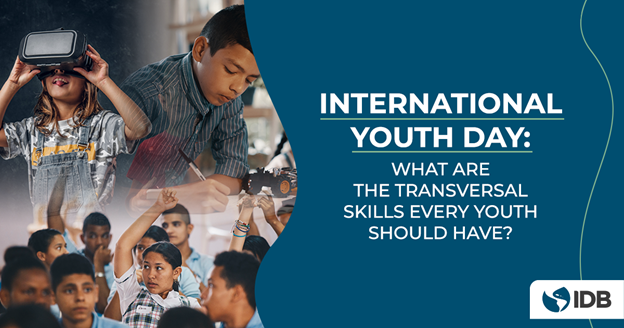In today’s rapidly changing global landscape, technical knowledge alone is not enough. Developing skills for life, including 21st century or transversal skills, is essential for young people to adapt, innovate, and thrive in various environments. The International Youth Day reminds us of the immense potential young people hold for shaping a better future. It is key to equip youth with the essential skills to attain personal and professional success in an increasingly complex world. Today, we are thrilled to launch our Brief Series on 21st century skills as part of our Skills for Life Initiative.
What does the 21st century skills briefs series consist of?
This series encompasses skills that were identified by experts as crucial for youth to thrive. Available both in English and Spanish, the series is geared towards policy makers and educators in Latin America and the Caribbean (LAC), answering questions such as:
- What does this skill entail?
- Why does this skill matter today?
- How can this skill be developed, especially in school setting?
- How to assess proficiency in this skill?
- Where to find more information and tools to enhance this skill?
Why focus on these skills?
The literature has already evidenced the significant improvements in students’ abilities, behaviors, attitudes, and academic performance due to 21st century skills. For example, skills such as critical thinking, communication, and collaboration enable individuals to navigate the complexities of the modern world, make informed decisions, and contribute meaningfully to society. Programs fostering these skills proved to be effective across diverse student groups, regardless of racial issues or income.
Incorporating 21st century skills into education bridges the gap between academic knowledge and real-world application. By fostering skills that enhance personal wellbeing and build cohesive, collaborative communities, we can equip future generations to create more inclusive and sustainable societies.
To kick off our series, we release our briefs on digital skills, resilience, and problem-solving.
Why are digital skills important for youth?
Digital skills are essential for everyday life, continuous learning, and adaptability to diverse circumstances. They are transferable across different settings and contribute to economic growth by boosting employability and opening doors to new fields such as IT, e-commerce, and digital entrepreneurship. Digital skills can also promote social inclusion by bridging the digital divide.
However, in promoting these skills, challenges in obtaining comparable digital skills results arise in LAC. And a significant digital skills gap is present in those few countries that have comparable measures. In 2020, only around 30% of adult population displayed basic digital skills compared to 80% of adults from Europe and Asia. Furthermore, only one in three youth (15–24 years old) from 10 LAC countries is on track to acquire digital skills, ranking below the world average.
Download Digital Skills Brief here!
Problem-Solving: a basis for developing other skills
Problem-solving skills form the basis for future learning, effective societal participation, and personal activities. In addition, they are key to the development of other 21st century skills, such as digital and socioemotional skills, etc. They contribute to improvement of academic performance, especially for science, technology, engineering and mathematics (STEM) and are vital for successful employment. Enhancing problem-solving skills can also help decrease depression and promote prosocial behaviors.
We need to attain higher levels of problem-solving skills in LAC. In PISA 2012, less than 2.5% of 15-year-old students in LAC participant countries achieved the two highest proficiency levels on creative problem solving; and in PISA 2015, only 9% did so on collaborative problem-solving.
Download Problem-Solving Brief here!
Resilience: Relevant for school, work and wellbeing
Resilience is also a critical skill, since it helps individuals recover from traumatic events and cope with stressful situations, contributing to individual and societal progress and prosperity. Although there’s not much comparable information about youth in LAC countries on this skill, the impact of COVID-19 has highlighted its importance. This skill has helped students to adapt to new learning strategies, deal with the enclosure, share their experiences with others, and readapt once the pandemic was over.
Resilience is also needed to deal with global warming and climate change effects at different levels, as well as with forced migration or displacement caused by humans (e.g., war, armed conflict, drug trafficking, etc.) and poverty. Furthermore, there is a vast literature informing about the relationship between resilience and self-esteem, self-efficacy, motivation, school engagement, assertiveness, and persistence, which are key to empowering youth as citizens throughout their lives.
Download Resilience Brief here!
On this International Youth Day let’s celebrate the potential of all Latin American and Caribbean students and in their capacity to build a brighter future. Do you promote Skills for Life in your country? Join the conversation in the comments below!


Leave a Reply